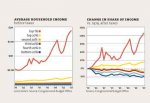Mach
DP Veteran
- Joined
- Oct 13, 2006
- Messages
- 27,745
- Reaction score
- 24,087
- Gender
- Male
- Political Leaning
- Slightly Liberal
You're more reasonable than most in how you position socialism, accepting the failures while not claiming entirely (as so many do on these forums) unimplemented.Historically, socialism has been a great failure, we definitely agree on that. My issue is highlighted above; it's failed as implemented.
But all roads lead to the same destinations unfortunately. In this case, you can approach your argument another way. This socialist utopia can be implemented at any time today in the U.S. We have the individual economic and political liberty (the core important things) to do so today. You can, or someone else can, obtain the land/capital/business necessary as the critical mass/catalyst for this utopian dream and it can be marketed and implemented with free people. If it's better, even if you have a tiny minority that believes in this why are they not doing it today in this way? We can claim it's for reason XYZ, but at the end of the day it's all talk, with no evidence. I would argue it's most probable there is no evidence because it's not attractive either in terms of outcome and/or cost/benefit.
But philosophically you should start with the premise that by definition no system that involves the countless multitudes of people can ever be perfect.Philosophically, I can not accept that our current system is perfect.
But they don't agree because of evidence. You don't agree because of faith (in spite of the evidence). You're being religious about it, they are being practical, and you cannot win the argument with reason if you're basing your claim on faith (not reason).I fully acknowledge that most economists are NOT going to agree with me.
even if it were the case it's irrelevant. Human society has risen and fallen throughout history no matter the time or system or structure. The idea that you're "predicting" a fall is more common sense based on historical evidence than anything else. At the very least.I know that I can sound like a doomsday preacher. The issue is the same as belief for global warming; most scientists/ecologists believe in it, but it's the same sort of logic. We've never actually had a global climate shift due to I hope people understand that I don't actually think capitalism will fail any time soon; I'm just wary of people that think there's always going to be enough of everything.
The problem with this argument, along with the same bad reasoning against the luddite fallacy, is the failure to discuss the entire system as a whole. When a job is removed due to technology, it typically fails to include the jobs gained from that technology. Necessity is the mother of invention, and if a particular industry declines, new industry is explored. Artificially propping up a failing industry is just throwing away time and money, and putting them way behind the race on that new industry that could have already been underway. Unemployment is bad, but if our system produces the lowest unemployment with the highest standard of living, opportunity, and freedom, the idea that it should be changed BECAUSE of one thing you perceive as negative is outrageous. Look again at the evidence around the world in the past 60 years. Countries with abysmal human rights, living standards, a tiny middle class and mostly poor, completely reforms their entire nation by adopting more capitalistic principles and low and behold poverty is drastically reduced almost overnight, middle class begins to boom, middle class then pushes for human rights, it's like the second coming. Seriously go read China or South Korea, or (nearly every currently OK economy). Read it sans partisan agenda. It's not because of the word capitalism. It's because of the structure of the systems. You could make all sorts of systems that use the same principles and it may not be capitalism but it will still function well. It has to do with division of power, accountability, feedback, a more direct carrot/stick for success or failure in a venture, tying risk to reward, skin in the game, non-central planning, etc., etc. These are what make capitalism function well, not the word, or the party that might support it, or big corporations. Look for the underlying reasons and you'll see.I blame modern capitalism for unemployment (something that doesn't happen in socialism, communism, or utopianism)


